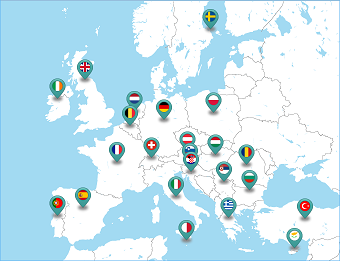Report examines financing, staffing and training of asylum authorities and the tools used to decide applications
The Asylum Information Database (AIDA) on Wednesday published a useful comparative report looking at the structure and resources of first instance asylum authorities in 23 European countries.
 The 63-page report is here.
The 63-page report is here.
The report explains: "This comparative report aims to provide an overview of the structure, composition and functioning of asylum authorities in the countries covered by the AIDA, with the aim to offer a better understanding of their operation."
The UK is covered in the report, although not extensively when compared to other countries.
AIDA considers the institutional architecture and organisation of the various determining authorities, their overall resources, including size and capacity, and the decision-making tools used by the staff of the determining authorities to examine and decide on applications for international protection.
Chapter one outlines some of the main organisational arrangements set up in determining authorities to deal with different types of asylum applicants and/or different asylum procedures. It looks at methods used to speed up applications and units dealing with specific applicants.
The report notes, for example, that in many countries (Austria, Belgium, Croatia, France, Greece, Poland, Portugal, Romania, Switzerland) there is, in principle, a single caseworker responsible for both performing the asylum interview and making the decision to grant asylum.
In other countries (including Germany, Slovenia, Sweden), the roles are separated and an interviewer drafts a report for a second official who will decide whether to grant protection or to reject the application. In Cyprus and Greece, the report of the interviewer also provides recommendations to the decision-maker.
AIDA says in the report: "Although the division of tasks between an interviewer and a decision-maker is allowed under EU law, it may thus raise concerns where it follows the objective of speeding up the asylum procedure. Completing the examination of an asylum application quickly by dividing tasks amongst the staff of the determining authority and/or by omitting to conduct further investigation (i.e. a second interview with the decision maker) should not prevail over the asylum seekers' right to an appropriate examination of their claim. The personal interview is as a crucial opportunity for the asylum applicant to explain the reasons for the asylum application but also for the authorities to identify and assess them. Determining authorities should thus ensure that decision-makers pro-actively verify the accuracy and detail of written interview reports and provide asylum seekers the opportunity to give an explanation regarding elements which may be missing and/or any inconsistencies or contradictions in their statements, in accordance with Article 16 of the recast Asylum Procedures Directive."
Chapter two of the report examines the resources of determining authorities in terms of financing and staffing, thus providing an overview of their size and capacity.
AIDA includes an interesting comparative table showing the large differences in the annual budget provided by Ministries to determining authorities in selected countries in 2018. Sweden had the largest annual budget in 2018, with €3,080,341,404.58, ahead of Germany's €1,800,000,000.00. In contrast, Hungary's budget last year was €321,676.17 and Slovenia's was the lowest at €181,073.71.
The report also has some interesting observations when looking at the full-time equivalent (FTE) staffing levels of the various determining authorities: "The Swedish Migration Agency for example has more than seven times the number of staff of the French OFPRA (6,109 staff in Sweden compared to 813.9 FTEs in France), but France registered a number of asylum applications that is five times higher than in Sweden (55,290 applications in France compared to 10,740 in Sweden as of June 2019). As already explained, this is due inter alia to the varying mandate of the respective determining authority. Similarly, despite the low number of staff within the OAR, Spain is dealing with a significantly higher amount of asylum applicants compared to other countries."
AIDA notes that processing times for asylum applications remain a serious matter of concern in Cyprus and Greece, with the average time taken in Cyprus for cases of well-founded applications being approximately 2-3 years.
The experience and training of caseworkers is also considered in the report.
The final chapter looks at the decision-making tools used by the various determining authorities. The chapter provides an overview of these tools and looks at how they are implemented in practice, and analyses the quality assurance and control mechanisms applied by certain determining authorities.
It considers the use of country information and the quality assurance and control mechanisms that have been established with a view to continuously improve the quality of decisions.
The report ends with a short set of conclusions and recommendations. They are in summary:
• ECRE believes that caseworkers should work in an institutional environment that is adequately human rights and protection-oriented, regardless of any EU or national interest.
• ECRE considers that the separation of authorities at first instance can raise different issues in practice.
• ECRE also warns against the involvement of law enforcement agencies at first instance.
• ECRE considers that resorting to an increased or decreased number of staff in the determining authority as an ad hoc strategy to meet existing needs does not necessarily contribute to the efficiency of the asylum procedure.
• Determining authorities should further systematically invest in the delivery of comprehensive and regular training courses to all staff.
• ECRE recommends that all determining authorities establish quality assurance and control mechanisms.
• Decision-making tools and quality reports should systematically be made public by determining authorities.